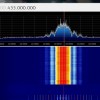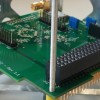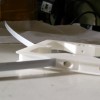As part of our objective to test fly 3D printed components on the UoS3 CubeSat the mechanism to deploy the antennas from their stored (launch) to operational position has been printed. Rather than using the common, fused deposition modelling technique, the part was printed using the selective laser sintering method by 3T RPD. The part […]
About Mark Coulter
Mark is a fourth year Aeronautics and Astronautics undergraduate at the University of Southampton specialising in Spacecraft Engineering. He is involved in the FEE (Engineering) GDP and heads up the publicity side of the UoS3 project.Author Archive | Mark Coulter

Successful communication test with SDR
This week the communications team successfully tested the breadboarded communications subsystem using a software defined radio (SDR). An SDR is a simple USB dongle that anyone can plug into a computer and tune to listen to the radio, or alternatively tune to the amateur radio frequencies (145 MHz and 433 MHz) to detect satellites using that […]

First PCB manufactured
The ECS GDP finished fabricating their first PCB today. The PCB combines the payload package, computer and data-handling unit on to a single board to save valuable space inside the 1U CubeSat. Rigorous testing will follow to ensure the board, computer and sensors perform as expected. Update 12 Jan 15 Initial testing of the gyroscopes can be […]

Project featured in University news article
The project received a moment of publicity as the University of Southampton featured an article on the UoS3 project on their website. You can read the full article here.

Work begins
September once again brings the beginning of the academic year and with this the next phase in the development of the University of Southampton Small Satellite project or UoS3. This year is focused on the design of the satellite subsystems, verifying those designs and integration into a non-flight demonstration model. Subsequently, we can progress to […]


